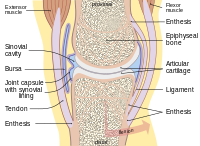
Photo from wikipedia
Background For focal cartilage defects, biological repair might be ineffective in patients over 45 years. A focal metallic implant (FMI) (Hemi-CAP Arthrosurface Inc., Franklin, MA, USA) was designed to reduce symptoms.… Click to show full abstract
Background For focal cartilage defects, biological repair might be ineffective in patients over 45 years. A focal metallic implant (FMI) (Hemi-CAP Arthrosurface Inc., Franklin, MA, USA) was designed to reduce symptoms. The aim of this study was to evaluate the effects of a FMI on the opposing tibial cartilage in a biomechanical set-up. It is hypothesized that a FMI would not damage the opposing cartilage under physiological loading conditions. Methods An abrasion machine was used to test the effects of cyclic loading on osteochondral plugs. The machine applied a compressive load of 33 N and sheared the samples 10 mm in the anteroposterior direction by 1 Hz. Tibial osteochondral plugs from porcine knees were placed in opposition to a FMI and cycled for 1 or 6 h. After testing each plug was fixed, stained and evaluated for cartilage damage. Results After 1 h of loading ( n = 6), none of the osteochondral plugs showed histologic signs of degradation. After 6 h of loading (n = 6) three samples had histologic signs of injury in the tangential zone (grade 1) and one had signs of injury in the transitional and deep zones (grade 2). Exploration for 6 h resulted in significant more cartilage damage compared to the shorter exploration time ( p = 0.06). However, no significant difference between saline and hyaluronic acid was evident ( p = 0.55 ). Conclusion Under physiologic loading conditions, contact with a FMI leads to cartilage damage in the opposing articular cartilage in six hours. In clinical practice, a thorough analysis of pre-existing defects on the opposing cartilage is recommended when FMI is considered.
Journal Title: BMC Musculoskeletal Disorders
Year Published: 2020
Link to full text (if available)
Share on Social Media: Sign Up to like & get
recommendations!